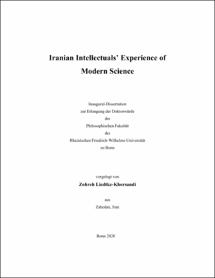Iranian Intellectuals’ Experience of Modern Science

Iranian Intellectuals’ Experience of Modern Science

| dc.contributor.advisor | Orthmann, Eva | |
| dc.contributor.author | Liedtke-Khorsandi, Zohreh | |
| dc.date.accessioned | 2020-04-27T17:45:41Z | |
| dc.date.available | 2020-04-27T17:45:41Z | |
| dc.date.issued | 10.02.2020 | |
| dc.identifier.uri | https://hdl.handle.net/20.500.11811/8318 | |
| dc.description.abstract | This study examines the picture of European science as it appeared to Iranians’ eyes and their perception of the relationship between new European science and Iranian’s indigenous science. The period on which this dissertation focuses is between the establishment of the first academy in Iran (Dār ol-Fonūn in 1851) and the second one (Tehran University in 1934). The aim of this study is to find the key presuppositions and the elements of discourse created in this era and its development and maintenance in the course of time. With the critical analysis of the discourse in four books (Maktūbāt-i Kamāl od-Dowle, 1862; Se Maktūb va Ṣad Khaṭābe, (date of publication unknown); Kitāb-i Aḥmad, 1894; Maqālat-i Jamālī-yi, 1883) and three journals (Kāveh, 1916-1922; Forūgh-i Tarbiyat, 1921; Iranshahr, 1922-1927) the study outlines how Iranian intellectuals reacted to the European science. The study reveals that Iranians had considered the Western sciences as a developed version of the Islamic-Iranian sciences. This inevitably led to the conclusion that the epistemological differences between Western and Iranian sciences could not be recognized and considered. As a result, Iranian intellectuals did not discuss the principles and prerequisites of modern science. Because of this, they could not formulate the relationships between new and old sciences. As a central result, this study traces changes of discourse on new science over time; from 1866, when Ākhūndzādeh admired European civilization, until 1932, when Kasravī accused Europeans of all the damage they had done to human societies. It shows that these intellectuals are on two extremes of a spectrum that started with a very positive assessment of Europeans and ended in denial. Inspired by Samuel Eisenstadt’s theory of multiple modernities, the dissertation concludes that Iranians, like other nations encountering modern European societies, made their own version of modernity, trying not to lose the core premise of their cultural program. In the continual construction of their new collective identities - their conception of “us” and the “other” - they selectively rejected many aspects of European modernity and instead created new hybrid forms of modernity. | en |
| dc.language.iso | eng | |
| dc.rights | In Copyright | |
| dc.rights.uri | http://rightsstatements.org/vocab/InC/1.0/ | |
| dc.subject | Modernität | |
| dc.subject | Diskurs | |
| dc.subject | neue europäische Wissenschaft | |
| dc.subject | indigene Wissenschaft | |
| dc.subject | Iran | |
| dc.subject | Prinzipien der Wissenschaft | |
| dc.subject | Modernity | |
| dc.subject | Discourse | |
| dc.subject | new European science | |
| dc.subject | indigenous science | |
| dc.subject | principles of science | |
| dc.subject.ddc | 300 Sozialwissenschaften, Soziologie, Anthropologie | |
| dc.subject.ddc | 950 Geschichte Asiens | |
| dc.title | Iranian Intellectuals’ Experience of Modern Science | |
| dc.type | Dissertation oder Habilitation | |
| dc.publisher.name | Universitäts- und Landesbibliothek Bonn | |
| dc.publisher.location | Bonn | |
| dc.rights.accessRights | openAccess | |
| dc.identifier.urn | https://nbn-resolving.org/urn:nbn:de:hbz:5-57541 | |
| ulbbn.pubtype | Erstveröffentlichung | |
| ulbbn.birthname | Khorsandi | |
| ulbbnediss.affiliation.name | Rheinische Friedrich-Wilhelms-Universität Bonn | |
| ulbbnediss.affiliation.location | Bonn | |
| ulbbnediss.thesis.level | Dissertation | |
| ulbbnediss.dissID | 5754 | |
| ulbbnediss.date.accepted | 10.11.2017 | |
| ulbbnediss.institute | Philosophische Fakultät : Institut für Orient- und Asienwissenschaften (IOA) | |
| ulbbnediss.fakultaet | Philosophische Fakultät | |
| dc.contributor.coReferee | Conermann, Stephan |
Dateien zu dieser Ressource
Das Dokument erscheint in:
-
E-Dissertationen (713)




